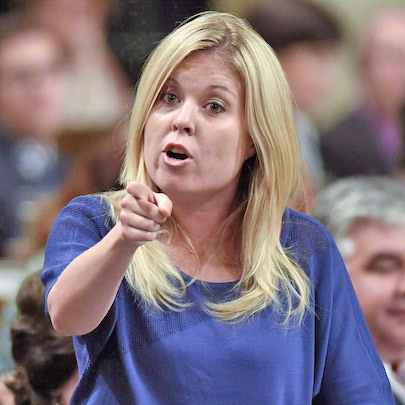Immigration

Michelle Rempel, the Conservatives' shadow minister for citizenship and immigration
Immigration Canada is being flooded with complaints after applicants trying to snap up spots for bringing parents or grandparents into the country under a new policy, were unable to access the system.
Immigration, Refugees and Citizenship Canada opened up to applicants its online form for indicating interest in sponsoring a family member through the 2019 Parent and Grandparent Program (PGP) on Monday January 28, 2019 at 9 am PST.
It took just 10 minutes for all the 27,000 online application spots to be filled. Immigration, Refugees and Citizenship Canada said over 100,000 individuals attempted to access the interest to sponsor form.
“Terrible! I had 4 different computers available for this. By the time I submitted the application, it said that the form it was closed!! Wow as a public figure in this country I am going to ask for answers for all the thousands of people that they never got a chance to even apply!” tweeted Patricia Jaggernauth.
Nisha Nigil tweeted; “Feeling defeated. This is ridiculous. Have been trying to get into the application cycle for the past seven years. They need to come up with a better system. We need to start lobbying or campaigning for this.”
“There needs to be an independent audit of IRCC's PGP sponsorship process. What happened today was a joke at best,” tweeted Samuel E. Ezebunandu.
Minister of Immigration, Refugees and Citizenship, Ahmed Hussen, said the government took steps to provide a first-in-first-served approach for 2019 after listening to and addressing concerns from clients and stakeholders about the previous intake process
“This approach will further enhance the client experience by keeping the application process fair for all while remaining an easy-to-access electronic method for applicants,” he said in a statement.
But for tens of thousands that was not the case.
“I had my schedule cleared, computer set up, kept refreshing every few seconds. Form went from open to closed right away. This is not a concert ticket you are selling; this is about uniting families. The whole process is atrocious,” said Naimul Khan.
As a family reunification program, the PGP Program gives Canadians and permanent residents the opportunity to have their parents and grandparents come to Canada to live permanently.
The PGP Program continues to be very popular, with continued high volumes in the interest to sponsor process. In 2018, after removing duplicates, the government received 93,836 interest to sponsor forms.
Consistently high admissions levels for parents and grandparents over the last few years has allowed the government to eliminate the application backlog. The application inventory has dropped from a peak of 167,000 people in 2011 to just over 28,000 people in October 2018.
Once invited, potential sponsors will have 60 calendar days from the date of their invitation to ensure IRCC receives their complete application for sponsorship.
Michelle Rempel, Shadow Minister for Immigration, Refugees, and Citizenship said the Liberal government is sending a very disturbing message to Canadians and newcomers: play by the rules and expect long delays and backlogs – if your application gets accepted at all.
Canada shut the door on parents and grandparents after a mere 10 minutes, she said.
“This is consistent with a pattern of failures that we see from the Liberal government on this issue. First, the Liberals abdicated responsibility by instituting a lottery system, leaving family unification to the “luck of the draw”, but those following the rules are given just minutes to submit their forms,” she said.
“Canadians and newcomers know that this situation is not fair. Those who play by the rules should not be pushed to the back of the line.”
If so, please ask them to join Heart & Stroke’s South
Asian Survivor Network!
While survivors face many barriers and challenges in coping with the disease and better managing their lives after a heart attack or stroke – we are interested in hearing their stories and wanting to confirm what the literature is telling us: that the psychosocial support an individual receives is co-related to their ability to recover and self-manage their condition.
For this we need your help! We need you to connect us to South Asian survivors and their care-givers/partners in your communities and have them join our South Asian Survivor Network and have them participate in one of our survivor focus groups to be held in the GTA this summer. Results from these focus groups will be shared with all of you and also help inform Heart & Stroke’s Promote Recovery Strategy.
Please help us recruit South Asian heart disease and stroke survivors and their care givers/partners to start engaging them on this important dialogue.
YOU connecting us to them would take us a step forward in understanding and listening to what OUR SURVIVORS truly need and help them RECOVER and self-manage their health!
Info: FIRDAUS ALI, South Asian Cultural Specialist, Ontario, Heart & Stroke C: 416-629-1689 firdaus.ali@heartandstroke.ca